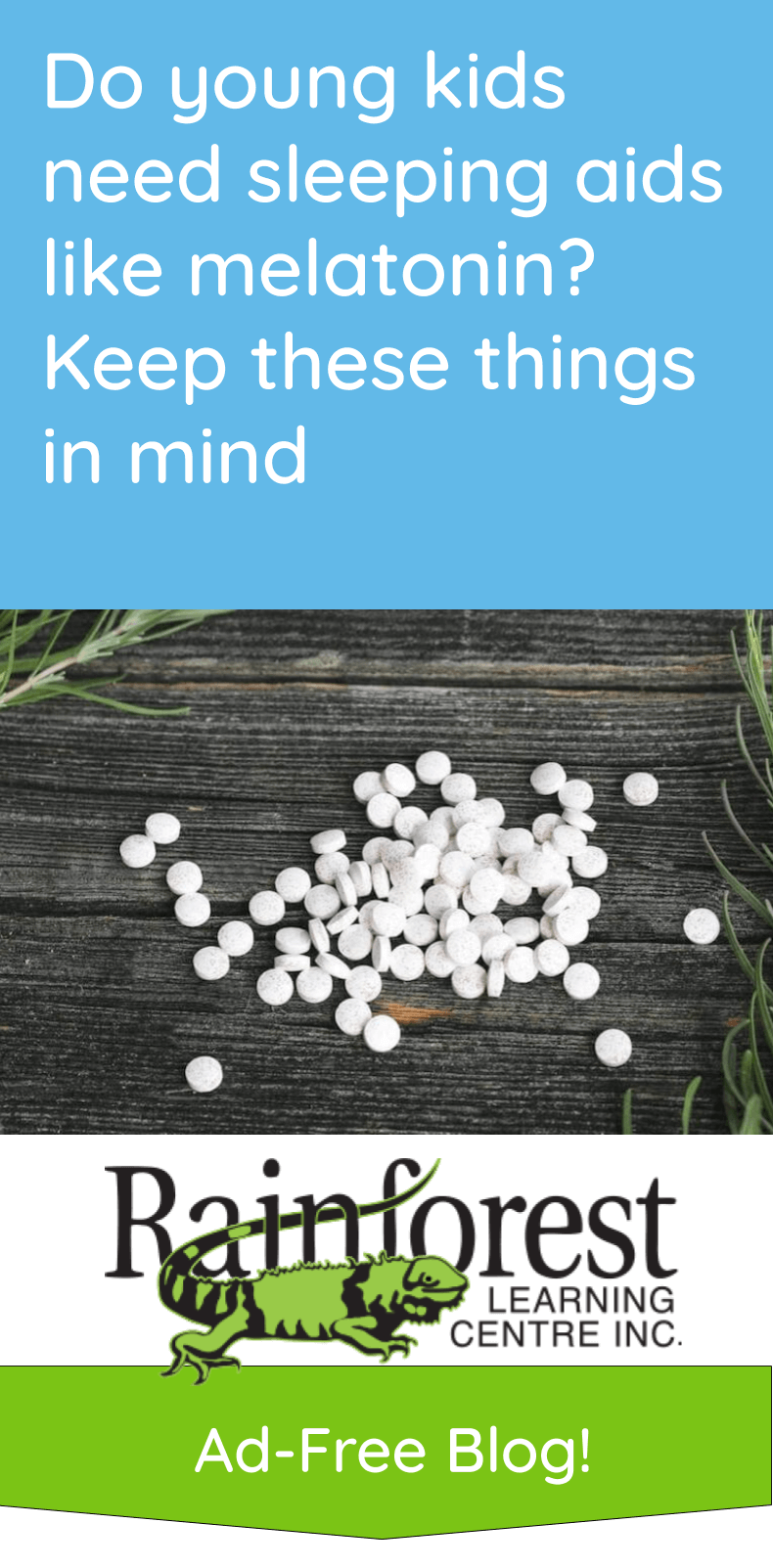
Sleep in early childhood is critical, as we know. However, around 15 – 25% of kids and teens have a hard time falling asleep. For parents, this can make bedtime exhausting – not to mention the toll it has on kids during their already busy days. So, one question you may have is whether young kids need sleeping aids, if they have trouble sleeping? What if the sleeping aid is ‘natural,’ or sold over the counter? Is it harmless, or harmful? We’ll attempt to address some of the things you should keep in mind as a parent, with regards to this topic.
Before we begin, please remember we are not doctors and scientists! We are early childhood educators doing research on the web, on topics we think would benefit parents. You should do your own research, and consult with a doctor about all of the information provided below. To help, we’ve tried to link to as many resources as possible for your further reading, in the body of this article.
If your child can’t fall asleep, your first resort should be sleep hygiene, not sleep aids
Keep in mind that humans are supposed to produce their own melatonin as a response to evening darkness, after being in sunlight during the day. It might sound too simple to be true, but it is. This is called circadian rhythm. Our bodies are on a clock, and usually, genetics makes our sleep-wake cycle consistent, even if it’s not ideal for everyone.
If your child can’t fall asleep, stop yourself before turning to medications or supplements as sleeping aids. You should really be asking if anything is interfering with their body’s natural response to light and darkness. And, their cyclical, normal body clock.
Common problems that inhibit kids falling asleep on time include:
- Exposure to screens and artificial light at night
- Inconsistent bedtime routines and schedules
- Eating certain foods at the wrong time
- Not enough time outdoors during the day
- Hot body temperatures
- Normal development
The other question to ask yourself is whether the problem is falling asleep, or daytime tiredness. A study has shown that parents who don’t get good sleep are tired during the day, and can assume their kids are also having the same problem, when they’re not. The way to solve this issue is by focusing on the whole family’s sleep routine. Everyone should be getting good sleep – not just the kids. So, perhaps your desire to turn to sleep aids is due to wanting kids to wind down sooner than they need to?
Remember: melatonin is a hormone. It’s not for knocking kids out – it’s for helping to regulate a pattern of sleep, by imitating – or encouraging – the body’s natural ability to do so. It won’t help kids waking up at night and wanting to cuddle in their parents’ beds, or having nightmares, etc.
There could be other reasons that sleep is not happening as well as it should for your kids. And if you’ve done your homework to confirm that sleep hygiene is not the problem, then it’s time to see a doctor. It may be more serious than child needing a sleep aid. But it may also
If you use melatonin for a child, make sure you’re using it right, and with your doctor’s advice
It’s possible to take melatonin the ‘wrong’ way. If you give a child too much, or administer it at the wrong time, it can result in daytime sleepiness. Melatonin, like other ingestible sleep aids, can take a while to get out of the body. This can then cause crankiness, and beat the whole point of giving a child the sleep aid in the first place.
One doctor who specializes in sleep has written a comprehensive breakdown of when to give kids melatonin as a sleep aid. His article also covers melatonin’s benefits for special needs cases, possible risks, and more. We highly recommend reviewing this resource carefully: https://drcraigcanapari.com/should-my-child-take-melatonin-a-guide-for-parents/
But before you play ‘doctor’ with your child, it’s best to see a real doctor. Your child’s sleep issues may be related to other practices or health conditions. Plus, any sleeping aids for children can have side effects, and this can be based on an individual’s makeup and medical history. We’ll cover more on that below.
Child sleeping aids and melatonin are not without side effects, even if they can be helpful for ADHD or Autism
Before we give you all the warnings about sleeping aids for kids, we should mention that generally speaking, melatonin is reported as safe (based on short-term studies). And, sleeping aids can sometimes be necessary for kids for who really need it. In fact, melatonin shows improvements in children with ADHD or Autism.
Melatonin is not widely studied for long-term use in kids. Moreover, even for adults, it’s not fully approved or regulated as a sleep solution, both in Canada and the USA. Sometimes, the Melatonin dosage on a label is not what it actually is, and no one is policing this. It’s also worth noting that in some countries around the world, it’s only available with a prescription – so it’s not considered harmless.
Some medical professionals are concerned that since melatonin is technically a hormone, it may have an effect on children’s puberty and development. But again, since it’s not been studied for the long-term, it’s hard to say how worried parents should be about this issue.
Melatonin and sleep aids can also interfere with other medications or health conditions. So no one – not even adults – should be taking it without the advice of a doctor.
If you think your kid needs other sleep aids, keep in mind you could get an opposite effect by trying some of the ‘tricks up your sleeve,’ or solutions you may find on the Internet. Antihistamines, which typically sedate adults, can sometimes make children more alert!
Sleeping aids can mask other, more serious issues for kids who can’t sleep
As we’ve mentioned above, if you’ve done all you can with sleep hygiene for kids, and still don’t see an improvement in both falling asleep, and daytime wakefulness, a doctor’s visit is probably due.
As you can see from this article, there are multiple medical conditions that can prevent kids from getting a good sleep. If your child has developed something like kicking-leg syndrome, or sleep apnea, this is something you’ll want to have diagnosed as early as possible. Giving kids something to make them drowsy, so they’ll fall asleep faster, may be masking the root cause of the problem. In some cases, this can even be dangerous, or imply long-term effects.
To conclude: young kids don’t always need sleeping aids, but when they do, they’re helpful
As you can see from the information above, sleeping aids for kids are usually only helpful in specific cases, after other solutions are tried first. It’s best to consider why your child isn’t falling asleep, or staying asleep, rather than to try a ‘band-aid’ right away. Many times, the answer can be as simple as their light-and-darkness exposure, which can be overlooked easily in our modern, electricity-powered world.
See related on our blog:
- 4 Strategies to help your toddler get a good night’s sleep
- The importance of sleep in early childhood
- Pros and cons of co-sleeping with your toddler or child, and how it affects daycare
- How to recognize signs of Autism in early childhood and what to do next
- Should young children be using electronics and media?
